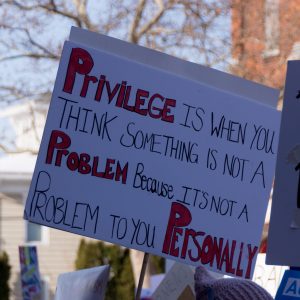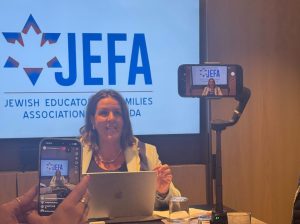- CORRECTION (3/18/25): This report has been edited from the original version to more accurately reflect a speaker’s deputation. The CJN apologizes to Stephen Ellis for the error.
A public hearing on a proposed antisemitism policy report submitted for the consideration of the Toronto District School Board (TDSB) was overtaken by anti-Israel voices, with many speakers condemning the report’s approach to defining antisemitism and its lack of explicit support for Palestinian narratives.
The virtual meeting on Wednesday, which lasted several hours and included over 90 delegates accommodated remotely due to a snowstorm, saw a substantial number of speakers identifying as Jewish anti-Zionists, many of whom rejected the report’s recognition of anti-Zionism as a form of antisemitism.
Affirming Jewish Identities & Addressing Antisemitism was a report drafted following months of consultations with Jewish community members, faith leaders, and advocacy organizations throughout Toronto. It outlines 32 recommendations, including integrating Jewish experiences into the curriculum beyond Holocaust education, increasing Jewish representation in staff positions, and explicitly addressing anti-Zionism as a form of contemporary antisemitism.
Throughout the hearing, a significant number of speakers—many of whom identified themselves as members of Independent Jewish Voices—expressed opposition to the report, arguing that equating anti-Zionism with antisemitism stifles free speech and delegitimizes Palestinian activism.
Numerous delegates used terms such as “genocide,” “ethnic cleansing,” and “apartheid” when describing Israel, which further inflamed the debate.
Gur Tsabar, a Jewish TDSB parent and self-described anti-Zionist, called Israel a “genocidal, fascist, immoral, inhumane, vile, depraved, white supremacist state,” and ended his delegate remarks with the call to “free every square inch of Palestine from the Jordan River to the Mediterranean Sea.”
TDSB employee delegate Jemila Pirbhai expressed fear over what she called the “censorship of Palestinian voices.” “Why is it that even though the Palestinian genocide has been confirmed by reputable international human rights organizations, there is still a deep-rooted fear in me to voice any connection between Israel and settler colonialism?” she said.
Stephen Ellis of the Legal Centre for Palestine stated, “It is not controversial to say that many have gone to great lengths to protect Israel from criticism during this time,” adding that the IHRA definition of antisemitism “deals mostly with how to protect Israel.”
“I can easily run afoul of the IHRA by stating that Israel is a racist state, which it is in actual fact.”
Ellis was among the numerous speakers who suggested the report be referred back to staff for more consultation.
“If Jewish students don’t want to be reminded of the unfolding genocide, should we protect them from those uncomfortable feelings? If the sight of a keffiyeh brings unease, should we be concerned about this? Should students be protected from the feelings a ‘Free Palestine’ slogan might generate.”
Several anti-Israel delegates referenced a December 2024 survey by the New Israel Fund of Canada, which found that 51 per cent of Canadian Jews do not identify as Zionists. However, the same report also states that 94 per cent of Canadian Jews support Israel’s right to exist. The survey speculates that Canadian Jews avoid calling themselves Zionists because they “confuse Zionism with certain policies of the Netanyahu government that they find objectionable.”
BONJOUR CHAI podcast @benmurane @MaytalKowalski @BovyMaltz https://t.co/x0Yjn98xsA pic.twitter.com/mACcRI4GSa
— The Canadian Jewish News (@TheCJN) December 13, 2024
Jewish organizations, including the group named Canadian Women Against Antisemitism, argue that dissenting delegates selectively cited the first statistic while ignoring the second in order to paint the antisemitism report as unreflective of the broader Canadian Jewish community.
Tamara Gottlieb, a founding member of the Jewish Educators and Families Association (JEFA), expressed disdain for the delegation hearing process, which, she says, welcomed lies and antisemitic rhetoric. “The libels of colonialism, of ethnic cleansing, of apartheid, and genocide—all heard here tonight—are only given space in a structure where narratives are valued over facts, where affirming identity is valued over student safety and outcomes,” she said during her delegation.
JEFA Stance on TDSB Antisemitism Report : End Identity Politics
— JEFA (@JEFA_Canada) February 11, 2025
JEFA has serious reservations. It’s band aid solutions to the bigger problem of DEI policies segregating, dividing, and othering each other. It is time to take a stand: DEI is wrong, and identity politics must end. pic.twitter.com/lyboNxbA6l
“Why is the TDSB giving forum to this hate? Why is our country’s largest school board hosting some of the most active members of the anti-Israel movement in Canada? Some who are not even Toronto residents. Why are we giving a forum to people who claim that (anti-Palestinian racism) is a serious problem for the TDSB when the TDSB has no recorded cases? Our schools are not safe—violence is at an all-time high, according to the auditor general. Academic performance is declining by all recorded measures. And by the TDSB’s own records antisemitism has skyrocketed—1000 per cent after the new equity policy, another 300 per cent after Oct. 7.
“So why are we all here?”
Revi Mula, a co-founder of Canadian Women Against Antisemitism, highlighted the reality Jewish students face during her delegation. “My children have been subjected to Jew-hatred in their classrooms, in their schoolyards, and even by teachers,” she said. “My children have been told to remove their Star of David necklaces. They faced swastikas, endured Nazi salutes, bullying, isolation, and intimidation, all because they are Jews.”
Representatives from Jewish organizations such as B’nai Brith Canada, Hillel Ontario, Centre for Israel and Jewish Affairs, and the Toronto Holocaust Museum, and numerous Toronto synagogues also expressed support for the report.
📢 CIJA Applauds TDSB Antisemitism Strategy as First Step in Combatting Jew-Hatred in Public Schools
— CIJA (@CIJAinfo) February 10, 2025
“We urge the @tdsb to continue its efforts to combat antisemitism and foster a culture of mutual respect and understanding for all faiths, backgrounds, and identities.” -…
Many of these delegates expressed concern that failure to implement these policies immediately will lead to more antisemitism in TDSB schools.
Shelley Laskin, a Jewish trustee with the TDSB who has expressed strong support for the report’s recommendations, spoke at the end of the virtual meeting, saying “true harm was spoken tonight.”
“There was antisemitism. There was Jew-hatred… This is not acceptable; no form of hate within deputations is acceptable, and I feel compelled to say that this has caused great harm to many of us who have listened for hours.”
Concerns over DEI framework and identity politics
Despite backing the report’s broad intent, some Jewish groups expressed reservations about its reliance on the diversity, equity, and inclusion (DEI) framework.
The document includes a recommendation to “ensure that there is representation of Jewish-identifying staff at middle and senior management levels.” This suggestion has been interpreted by some as advocating for staffing quotas based on religious identity, which has led to criticism. Critics argue that implementing such quotas could be seen as tokenism and may not effectively address the root causes of antisemitism within the school system.
JEFA criticized the report for embracing identity politics, arguing that it perpetuates the divisions that have allowed antisemitism to flourish. “DEI policies have created a hierarchy of victimhood in which Jewish students are placed in an uncomfortable position,” Gottlieb said. “Rather than ensuring equal treatment for all, these policies reinforce separation and resentment.”
Gottlieb told The Canadian Jewish News that JEFA wants the motion to pass, “but we want real work on addressing antisemitism to begin by reevaluating the equity policies on the books which have directly contributed to the skyrocketing rates of antisemitism.”
She says that there are foundational problems that allow TDSB teachers to continue painting Israel as oppressors. “Our deeply held concerns about DEI are that it creates a framework that almost universally paints Zionism—incorrectly—as a political movement.”
Michelle Stock, vice-president, Ontario, Centre for Israel and Jewish Affairs (CIJA), cautioned against the recommendation for schools to implement “safe spaces” for Jewish students.
“Jewish students must not only have safe spaces but also be welcomed and included in all spaces within the TDSB, without segregation,” Stock said.
Stock, however, supports the report and asks that it is received immediately, without ammendments.
“The strategy affirms that the vast majority of Canadian Jews identify Israel as the ancestral homeland of the Jewish people and believe in the right of the Jewish state to exist, confirming this a core value of Jewish identity and demonstrating why the International Holocaust Remembrance Alliance (IHRA) Working Definition of Antisemitism is the consensus definition that best reflects the lived experience of Jews today.”
What comes next?
The TDSB is expected to reconvene Thursday at 4:30 p.m. for a final vote on the report. With the hearing exposing deep divisions not just within the broader community but also among Jewish speakers, the outcome will have significant implications for how antisemitism is defined and addressed in Toronto’s public schools.
Jewish leaders have warned that the failure to adopt a strong, comprehensive policy could embolden further antisemitic incidents. However, with opposition voices mobilizing against the report’s provisions on anti-Zionism, the vote remains unpredictable.
On Feb. 13, Deborah Lyons, Canada’s Special Envoy on Preserving Holocaust Remembrance and Combatting Antisemitism, sent a letter to all TDSB trustees urging them to fully adopt the report and its recommendations without amendment. She further highlighted the need for proactive measures to combat antisemitism within educational institutions.
Announcing this letter on social media, Lyons commended the school board for consulting with her office and other Jewish community members in preparing the report.
Today I sent this letter to all @TDSB trustees, encouraging them to accept the Affirming Jewish Identities and Addressing Antisemitism report and recommendations in full. We are closely watching tonight’s committee meeting and hope to see the Trustees affirm that antisemitism -… pic.twitter.com/fVNPeayNF6
— Deborah Lyons (@DeborahLyonsSE) February 13, 2025
“The antisemitism being experienced by Jewish students, families, teachers and staff at the TDSB, as captured in the report before you is chilling. The uptick in contemporary forms of antisemitism, especially those that manifest as anti-Zionism or anti-Israeli expressions in not unique to the TDSB,” Lyons wrote. The IHRA definition of antisemitism, which the board adopted in 2018, “provides the framework for being able to name and identify antisemitism in all its forms.
“We are closely watching tonight’s committee meeting and hope to see the Trustees affirm that antisemitism—in all its forms—has no place in Toronto schools.”
- FOLLOW-UP REPORT: Toronto school board votes to receive antisemitism report after heated two-day debate
Author

Mitch is The CJN's campus and education reporter based in Toronto, Ont. He has a passion for investigative research, long-form feature writing and digital journalism. His book, Home Safe, was published by Dundurn Press in November 2022.
View all posts








